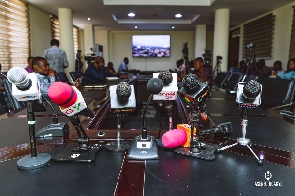Ghanaian journalists have been advised not to be in a hurry to report or publish stories without subjecting such issues to intensive examination and fact-checking.
Robert Ajene, the Chairman of the Upper East Regional National Media Commission Advisory Committee who gave the advice said journalists had the duty to uphold the peace and stability of the country with factual and balanced reportage.
“When you are reporting on something that you have personal interest in, do not publish it because you are bound to support one side,” Ajene said, adding, “when you also want to make a reportage when you have not examined the materials to be good enough, do not put it in the news”.
Ajene explained that information not examined was not worth sharing as it would not be relevant but had the potential to cause conflicts or reignite existing conflicts.
Ajene who is also a Retired Educationist gave the admonition at Bolgatanga during the launch of the second edition of awards of the Upper East Regional branch of the Ghana Journalists Association (GJA).
The awards which would come off October 6, 2023, is on the theme, “Safeguarding the Peace and Security of The Upper East Region: The Role of The Media.”
He acknowledged the difficulty journalists faced in their line of duty in the country and encouraged them not to be influenced to shield facts but instead uphold professionalism that would inure to the development of the ordinary people.
“You have taken by the bull by the horns, so speaking the truth, you will succeed in bringing out what people will embrace and praise, so stand firm and we the observers will clap hands for you,” he added.
William Nlanjerbor Jalulah, the Upper East Regional Chairman of the GJA noted that journalists had the potential of breeding conflicts when they publish information with verification and urged media practitioners in the region to be circumspect when on reporting on conflict related issues in the region.
“If we must report on any conflict, let us cross check our information very well. If after crosschecking and we are still in doubt, leave out. It is better not to report on matters you are not sure about the accuracy of your information than to report and mislead the public because the consequences of such could be dire,” he added.
On fighting violent extremism, Jalulah urged the journalists to work with the security agencies to ensure reportage did not inform suspects to strategies and succeed in their attack but rather would help the security agencies to clamp down in such suspects.
The categories to be awarded include Journalist of the Year, Agriculture Reporting, Child Protection, Human Rights, Water and Sanitation, Conflict Reporting, Environment, Health, Gender, Disability, Sports, Best Radio Station, Tourism and Culture, Best Radio Programme, and a number of honoury awards.
Entries have been opened from July 28, 2023, to August 29, 2023, at 1700 hours.
Professor David Millar, President of Millar Institute of Transdisciplinary and Development Studies, Jaladeen Abdulai, Upper East Regional Director of the Commission on Human Rights and Administrative Justice, and Samuel Adadi Akapule, a Communication Lecturer at the Bolgatanga Technical University were inaugurated as the Awards Vetting Committee.
General News of Saturday, 29 July 2023
Source: GNA













